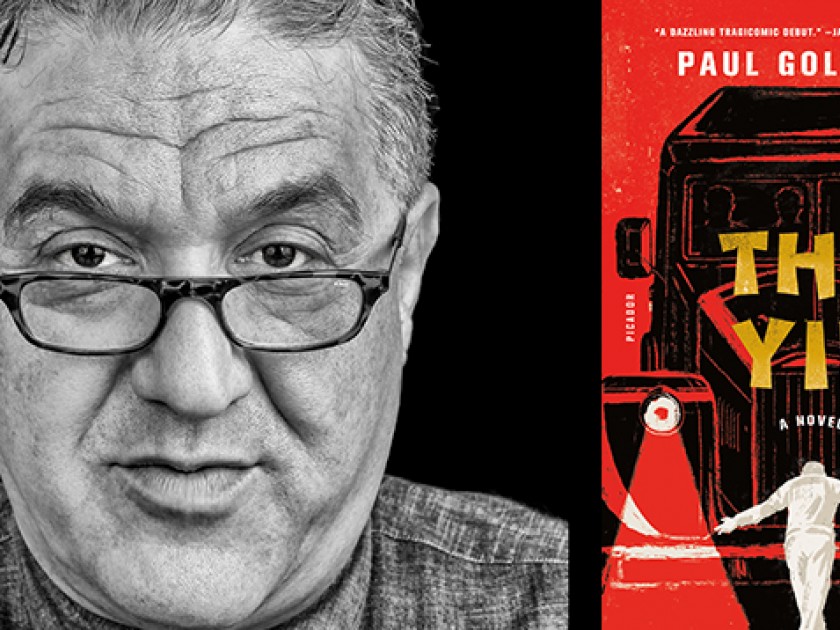
Jewish Book Council is proud to introduce readers to the five emerging fiction authors named as finalists for the 2017 Sami Rohr Prize for Jewish Literature. Today, we invite you to learn more about Paul Goldberg and his book, The Yid, a novel about the hijinks of a troupe of Russian Jews plotting to assassinate Stalin in February, 1953.
A warm congratulations to Paul and the other four finalists: Idra Novey, Adam Ehrlich Sachs, Rebecca Schiff, and Daniel Torday. Join Jewish Book Council on May 3, 2017 at The Jewish Museum for a discussion with the authors and announcement of the recipient of the $100,000 Sami Rohr Prize for Jewish Literature! Register for free tickets here »
What are some of the most challenging things about writing fiction?
I have a full-time job- as a reporter. It’s heavy-duty investigative reporting. Plus, I run and write for The Cancer. The most challenging aspect for writing fiction is clearing the brain space to sit down and do it. Please don’t mistake this for whining: having to fight to find the time and space to write, generates a sense of urgency. You can’t fake that — it has to be real.
What or who has been your inspiration for writing fiction?
I learned as a kid in Moscow in the 1960s that books have power, and writers who are willing to tell the truth run the risk of getting arrested. I remember Moscow being abuzz about publication of Bulgakov’s The Master and Margarita, the arrests and trial of Daniel’ and Sinyavski, the trial of Iosif Brodski, and, of course, Solzhenitsyn’s battles with the authorities. Fiction allows you to tell the truth — and that’s the ultimate privilege.
Who is your intended audience?
I try not to think about that. My job is to tell the story.
Are you working on anything new right now?
I have just turned in my next novel, The Chateau. It’s scheduled for publication in February 2018. The Chateau is set in South Florida. It’s about a building full of Trump-supporting former Soviet Jews. Would anyone be surprised to learn that the Board of Directors of the Chateau is full of crooks?
What are you reading now?
Everything Brecht. I am going through every play. This is a great time for Brecht.
Top 5 favorite books
The Master and Margarita by Mikhail Bulgokov
Good Soldier Svejk by Jaroslav Hasek
The Adventures of Huckleberry Finn by Mark Twain
Evgeny Onegin by Alexander Pushkin
The Catcher in the Rye by J. D. Salinger
When did you decide to be a writer? Where were you?
I was a child in Moscow. My father is a journalist and a poet, so since the day I was born I knew that it’s possible to write and knew many people who did. Journalism is great — my job is a privilege — but a novelist can drill deeper into the truth and its inverse.
What is the mountaintop for you — how do you define success?
I am happy where I am.
How do you write — what is your private modus operandi? What talismans, rituals, props do you use to assist you?
I love running away to Vermont for a month in the summer and a month in the winter. I end up telecommuting, so I am working full time in my day job. I am much more productive in Vermont. In the summer, it has something to do with picking mushrooms — a great Russian pastime. And I am a fiend on my bicycles. In the winter, it’s about cross-country skiing, being alone in the woods, or watching my dogs run ahead. It’s a happy place, like Russia with mountains and without kleptocracy. I finished three of my most recent books in Vermont.
What do you want readers to get out of your book?
As a novelist, I write about the intelligentsia and fascism, and how the two clash. I treat fascism as a polarity rather than an isolated historical event. It’s been with us for centuries, and it has not gone away. The other part of it is my obsession with people who have the nobility of the spirit to stand up for the truth. This is my material.
Paul Goldberg first heard a Moscow version of the myth about Jews using blood for religious rituals when he was ten, in 1969. By the time he emigrated to the US in 1973, he had collected the Moscow stories that underpin The Yid. As a reporter, Goldberg has written two books about the Soviet human rights movement, and has co-authored (with Otis Brawley) the book How We Do Harm, an expose of the U.S. healthcare system. He is the editor and publisher of The Cancer Letter, a publication focused on the business and politics of cancer. He lives in Washington, D.C.